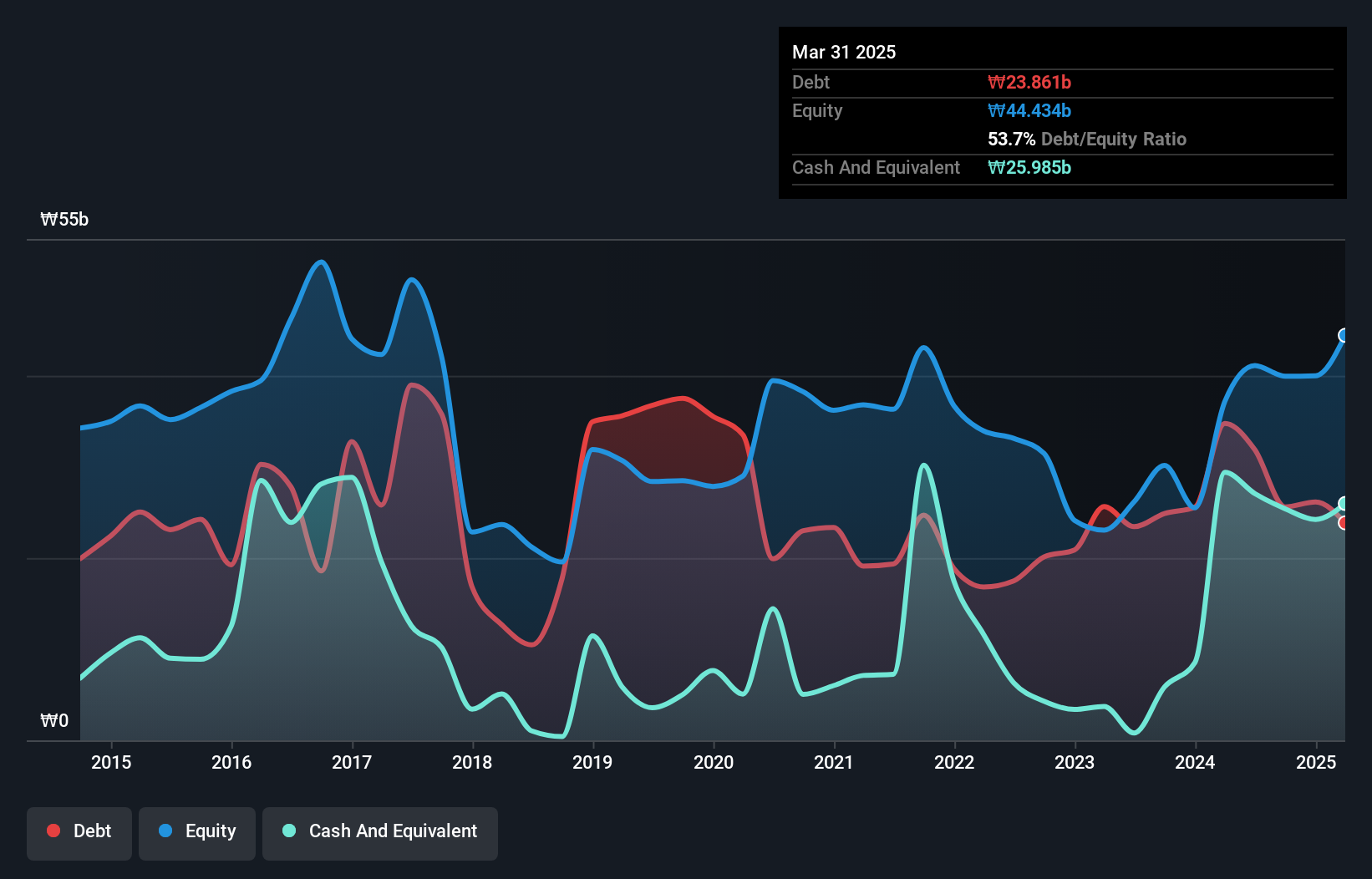Warren Buffett famously said, 'Volatility is far from synonymous with risk.' So it might be obvious that you need to consider debt, when you think about how risky any given stock is, because too much debt can sink a company. As with many other companies KODI CO., LTD (KOSDAQ:080530) makes use of debt. But the more important question is: how much risk is that debt creating?
What Risk Does Debt Bring?
Debt and other liabilities become risky for a business when it cannot easily fulfill those obligations, either with free cash flow or by raising capital at an attractive price. Ultimately, if the company can't fulfill its legal obligations to repay debt, shareholders could walk away with nothing. However, a more common (but still painful) scenario is that it has to raise new equity capital at a low price, thus permanently diluting shareholders. Of course, debt can be an important tool in businesses, particularly capital heavy businesses. When we think about a company's use of debt, we first look at cash and debt together.
What Is KODI's Debt?
As you can see below, KODI had ₩23.9b of debt at March 2025, down from ₩34.8b a year prior. But it also has ₩26.0b in cash to offset that, meaning it has ₩2.12b net cash.

How Strong Is KODI's Balance Sheet?
Zooming in on the latest balance sheet data, we can see that KODI had liabilities of ₩32.0b due within 12 months and liabilities of ₩5.23b due beyond that. Offsetting these obligations, it had cash of ₩26.0b as well as receivables valued at ₩14.6b due within 12 months. So it actually has ₩3.38b more liquid assets than total liabilities.
This surplus suggests that KODI has a conservative balance sheet, and could probably eliminate its debt without much difficulty. Succinctly put, KODI boasts net cash, so it's fair to say it does not have a heavy debt load!
See our latest analysis for KODI
We also note that KODI improved its EBIT from a last year's loss to a positive ₩3.4b. The balance sheet is clearly the area to focus on when you are analysing debt. But it is future earnings, more than anything, that will determine KODI's ability to maintain a healthy balance sheet going forward. So if you're focused on the future you can check out this free report showing analyst profit forecasts.
Finally, a company can only pay off debt with cold hard cash, not accounting profits. While KODI has net cash on its balance sheet, it's still worth taking a look at its ability to convert earnings before interest and tax (EBIT) to free cash flow, to help us understand how quickly it is building (or eroding) that cash balance. Over the last year, KODI actually produced more free cash flow than EBIT. That sort of strong cash generation warms our hearts like a puppy in a bumblebee suit.
Summing Up
While we empathize with investors who find debt concerning, you should keep in mind that KODI has net cash of ₩2.12b, as well as more liquid assets than liabilities. The cherry on top was that in converted 141% of that EBIT to free cash flow, bringing in ₩4.8b. So we are not troubled with KODI's debt use. There's no doubt that we learn most about debt from the balance sheet. However, not all investment risk resides within the balance sheet - far from it. For instance, we've identified 4 warning signs for KODI (1 can't be ignored) you should be aware of.
Of course, if you're the type of investor who prefers buying stocks without the burden of debt, then don't hesitate to discover our exclusive list of net cash growth stocks, today.
Valuation is complex, but we're here to simplify it.
Discover if KODI might be undervalued or overvalued with our detailed analysis, featuring fair value estimates, potential risks, dividends, insider trades, and its financial condition.
Access Free AnalysisHave feedback on this article? Concerned about the content? Get in touch with us directly. Alternatively, email editorial-team (at) simplywallst.com.
This article by Simply Wall St is general in nature. We provide commentary based on historical data and analyst forecasts only using an unbiased methodology and our articles are not intended to be financial advice. It does not constitute a recommendation to buy or sell any stock, and does not take account of your objectives, or your financial situation. We aim to bring you long-term focused analysis driven by fundamental data. Note that our analysis may not factor in the latest price-sensitive company announcements or qualitative material. Simply Wall St has no position in any stocks mentioned.
About KOSDAQ:A080530
KODI
Manufactures and sells cosmetics and cosmetic containers in South Korea.
Excellent balance sheet with low risk.
Market Insights
Community Narratives



